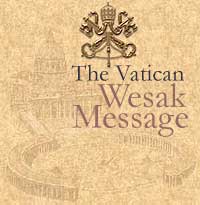Vatican: Peace education could help Buddhist-Christian conflicts
By Carol Glatz, Catholic News Service, April 25, 2007
VATICAN CITY -- Conflicts between Buddhists and Christians can be resolved through peace education, said the Pontifical Council for Interreligious Dialogue.
 The "sad reality" of continued prejudice and misunderstanding can be overcome by educating people about other faiths and by helping families and schools reinforce the value of peaceful coexistence, the council said in a message to Buddhists preparing for the feast of Vesakh.
The "sad reality" of continued prejudice and misunderstanding can be overcome by educating people about other faiths and by helping families and schools reinforce the value of peaceful coexistence, the council said in a message to Buddhists preparing for the feast of Vesakh.
The feast, which commemorates the principal events in the life of Siddhartha Gautama, Buddhism's founder, is celebrated April 8 in Japan and Taiwan and between May 2 and 31 in other countries. The Vatican released the message, signed by the council's president, Cardinal Paul Poupard, and secretary, Archbishop Pier Luigi Celata, April 25.
"Even in places where people experience daily the ravages of war, fueled by sentiments of hatred and vengeance, trust can be restored," the message said.
Civil and religious leaders from both faith communities need to work together "to create the space and the opportunities for people to talk, listen, share regrets and offer forgiveness for each other's past mistakes," it said.
The message made no mention of specific areas of concern, but relations between Buddhists and Christians in some parts of Asia have been tense. Some Christians have led attacks against Buddhist temples in parts of South Korea, for example, while some Christian churches in predominantly Buddhist Sri Lanka have been the targets of violence.
The violence and some government efforts to limit religious freedom, such as the right to convert, are sometimes linked to what is seen as aggressive proselytism by some Christian groups.
The Vatican message said educating for a peaceful and harmonious society "starts in ordinary homes" with families trying to pass on traditional and moral values to their children.
It said public and faith-based schools need to support parents in their task of forming their children's consciences as well as offer a "value-based education which reinforces respect, acceptance, compassion and equality."
The message encouraged people working in the mass media to "exercise their moral conscience" and help "dispel ignorance and impart knowledge, preserve social values and portray the transcendental dimension of life" arising from people's spiritual beliefs.

 The "sad reality" of continued prejudice and misunderstanding can be overcome by educating people about other faiths and by helping families and schools reinforce the value of peaceful coexistence, the council said in a message to Buddhists preparing for the feast of Vesakh.
The "sad reality" of continued prejudice and misunderstanding can be overcome by educating people about other faiths and by helping families and schools reinforce the value of peaceful coexistence, the council said in a message to Buddhists preparing for the feast of Vesakh.